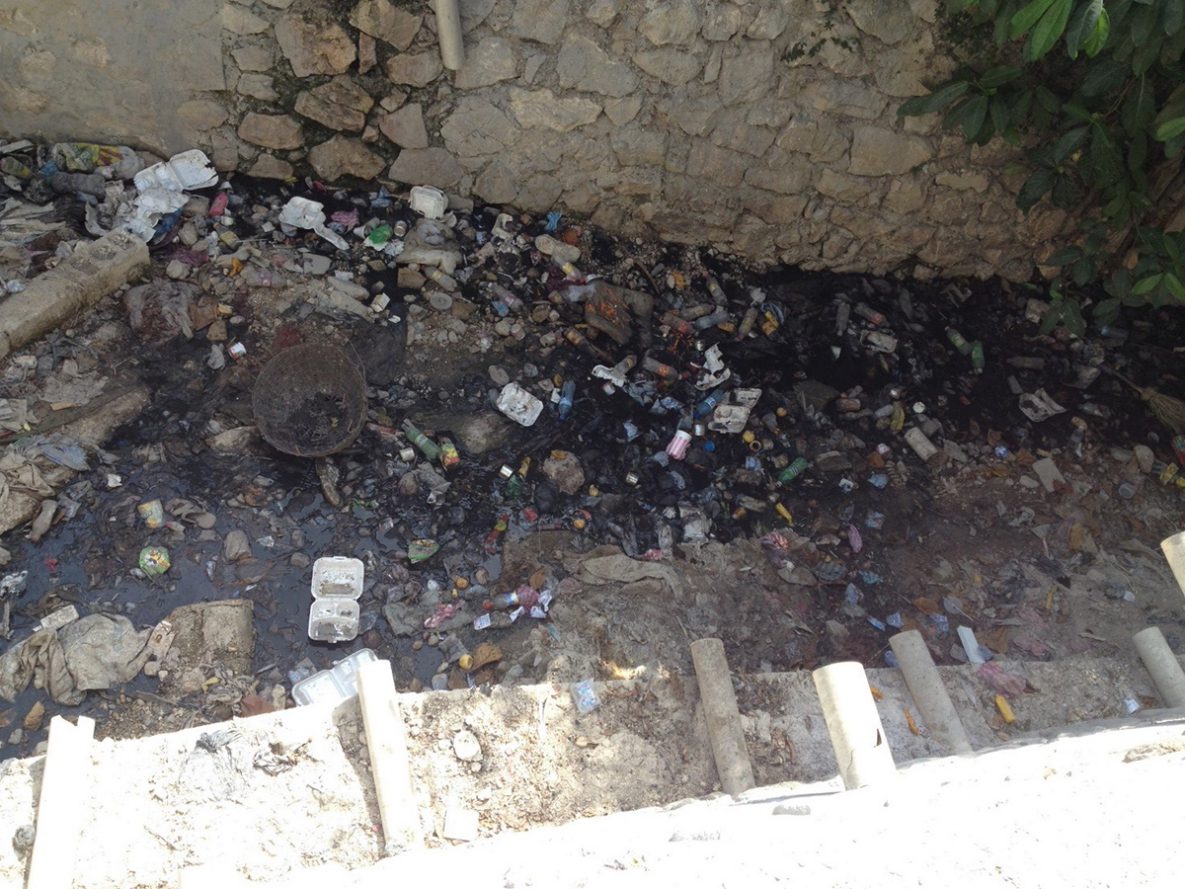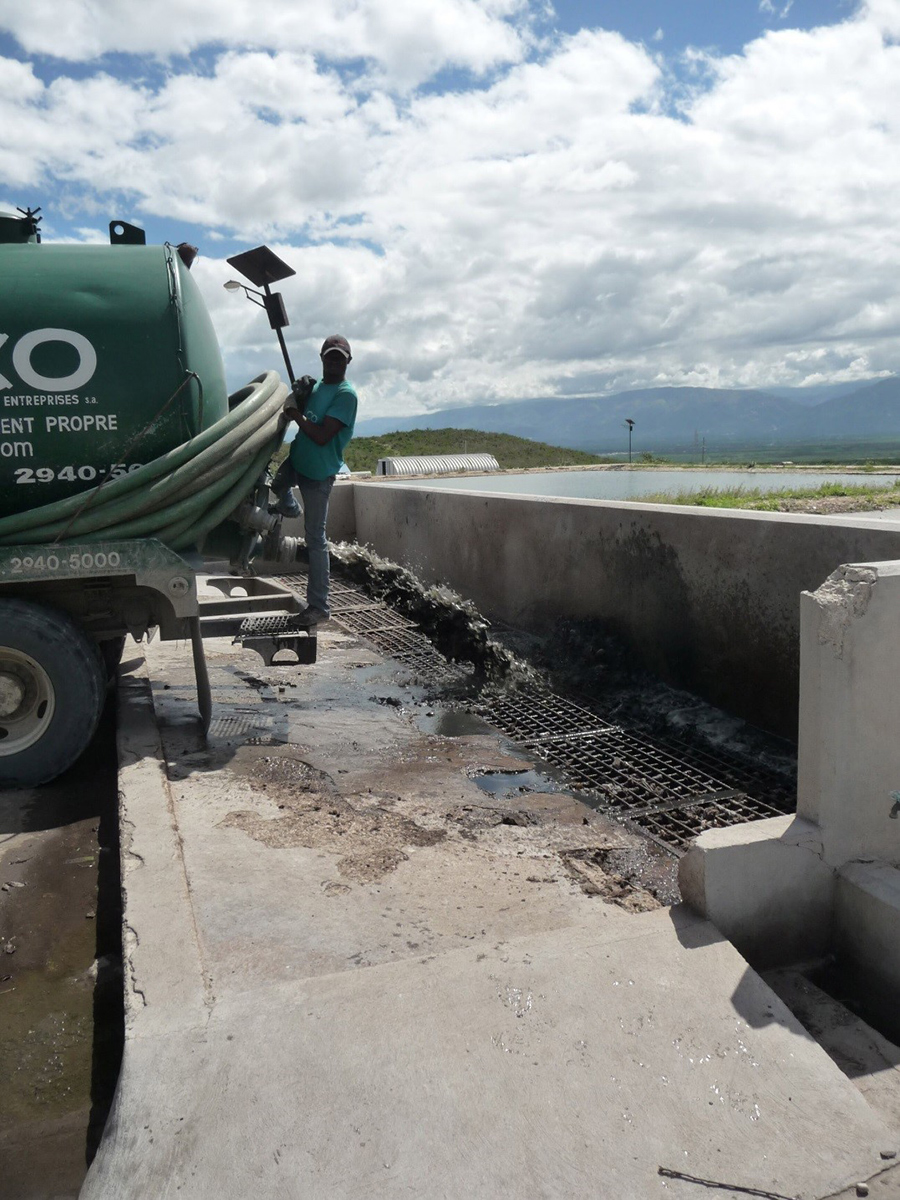Sanitation Saves Lives: Fecal Sludge Management in Haiti
By Adrienne Lefevre, MPH, CHES
This web page is archived for historical purposes and is no longer being updated.
Basic sanitation services are defined as access to and use of “improved facilities” that do not have to be shared with other households. Improved facilities include: flush/pour flush to piped sewer system, septic systems or pit latrines; ventilated improved pit latrines, composting toilets or pit latrines with slabs.
The world is in the midst of a global sanitation crisis – about 2.3 billion people lack access to even basic sanitation services. Ensuring people around the world have access to basic sanitation services is vital to preventing the spread of infectious diseases and protecting our health.
Without access to a toilet, people around the world have no choice but to defecate (poop) outside in public (open defecation). This not only leaves individuals vulnerable to violence and embarrassment, but also encourages the spread of deadly infectious diseases like cholera, dysentery, hepatitis A, and typhoid. Progress has been made in providing access to improved sanitation facilities, which has greatly reduced open defecation. Yet, there is still much work to be done.

An example of poor fecal sludge management with septic tanks overflowing into drainage canals in the heart of Port-au-Prince, Haiti (Photo courtesy of Andrea Martinsen, CDC)
Global Commitment to Sanitation
Increasing access to sanitation is a global priority. Currently one in five children die from diarrheal diseases, which is more than that from AIDS, malaria, and measles combined (UNICEF and WHO 2009). In addition to health benefits, improved sanitation has significant economic benefits.
Much of the progress to date comes from the increased use of onsite sanitation technologies, such as pit latrines or septic systems. Waterborne, sewer-based systems are costly and require large amounts of water.
Without proper management, onsite sanitation facilities can fill up and “fecal sludge” can end up in the local environment. Poorly engineered or poorly maintained onsite sanitation facilities can allow fecal sludge to seep into groundwater sources. Fecal sludge consists of feces, urine, and water. For these reasons and more, fecal sludge poses a major threat to public health without proper management.
CDC Supports Global Improvements in Sanitation

Fecal sludge dumping at the Morne a Cabri wastewater stabilization pond CDC evaluated (Photo courtesy of Andrea Martinsen, CDC)
Haiti suffers from the worst water and sanitation infrastructure in the Western Hemisphere. Following the 2010 cholera outbreak, the need to improve water and sanitation was critical in Haiti. CDC began working closely with Haiti’s National Directorate of Potable Water and Sanitation (DINEPA) to address crucial water, sanitation, and hygiene issues. A key piece of the response was fecal sludge management in Port-au-Prince.
At the request of DINEPA, the CDC Haiti country office and CDC’s Emergency Response and Recovery Branch conducted an evaluation of a waste management facility and its operational capacity. Before the 2010 earthquake, no waste disposal or treatment facility existed in Haiti and fecal sludge taken from sites was often dumped into open canals or municipal solid waste dumps. This open dumping posed huge health threats and needed to be addressed.
CDC sanitation experts investigated the incoming fecal sludge and evaluated the performance of the treatment facility. While it was determined that the facility was effective in treating the waste, much more capacity for disposal and treatment is needed in the capital Port-au-Prince and around Haiti. DINEPA is working with partners to rehabilitate other existing, but not functional, facilities to expand disposal capacity.
CDC continues to provide technical assistance to DINEPA as it moves forward with reconstruction of other waste management facilities and considers design modifications to protect the public’s health.
CDC’s partnership with DINEPA has helped shine a light on the importance of investments in fecal sludge management in Haiti, helping to make sure that access to toilets increases and that all waste is safely managed. Time and energy put into improved sanitation will ensure that harmful waste does not end up back into the environment, posing potential health threats. As millions still openly defecate worldwide, the global sanitation crisis remains a pressing issue for CDC and the international public health community.